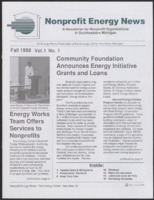See a related article from the Ecology Center's website, Energy Justice Since the ‘70s: Energy Works
Nonprofit Energy Works
After seeing the successful expansion of the Home Energy Works program, the Ecology Center staff decided to extend free energy services to non-profit organizations in seven counties across Southeast Michigan. Most nonprofit organizations had very little funding allocated to capital improvements, and the Ecology Center believed these organizations could better serve their communities if they could cut utility costs and improve their workspaces. In partnership with Marygrove College in Detroit, the Technical Development Corporation in Boston, and the United Ways of the seven counties, the Ecology Center developed its Nonprofit Energy Works program. Supported by a generous grant from the Community Foundation of Southeastern Michigan, the program began in 1988.
Like the residential program, the nonprofit consultation consisted of several components, including energy conservation training, a walk-through audit, and low-cost implementation services for non-profit-owned buildings. The Ecology Center hosted workshops at Marygrove College and at the UAW headquarters, maintaining that there had to be "a connected sequence of services beginning with information and education and extending to audits, low-cost measure installation, major measure installation and maintenance training." The Ecology Center also worked with both Michigan Consolidated Gas Company and Detroit Edison to ensure that non-profit organizations had access to discounted or free technical energy audits. Most non-profits had never received a technical audit because the service cost between $1,200 and $1,500 for a typical 10,000 square-foot facility.
In addition to on-site improvements, the Ecology Center published a newsletter, Nonprofit Energy News. The newsletter focused on energy use problems faced by nonprofits and included articles on a range of subjects dealing with low cost energy-saving measures, energy efficient heating, cooling, and lighting systems, energy use reduction through landscaping, and advice for receiving energy loans and financial assistance.
In this video, Aileen Gow, the project manager for the Ecology Center's Nonprofit Energy Works grant program, notes that the EC model informed work at the Lansing Board of Water and Light:
"We gave mini-grants and maxi-grants to help nonprofits save on their energy use. All these years later, we've been able to, at the Lansing Board of Water and Light, follow a similar model and they're giving grants to nonprofits that serve the low income population ... They have very limited funds for capital expenses, it all goes to programs, and just about every one of them pretty much needed new lighting. So we've been going to them. And in return, they've been wonderful about spreading the word about our energy assessments, and we were able to get in the door."
By supporting community organizations, the Ecology Center Energy Works programs not only lowered utility bills for non-profits but also reduced their carbon footprint. This combination of public good and environmental good exemplified the EC's commitment to promoting stewardship and care for both the planet and its people.


